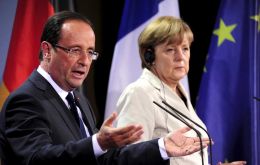MercoPress. South Atlantic News Agency
Tag: Eurozone crisis
-
Friday, April 11th 2014 - 22:06 UTC
Greece returns strongly to the bond market with a 3-billion Euro issue at 4.95%

Two years after it nearly crashed out of the Euro zone, Greece returned to the bond market this week with yield-hungry investors rushing to buy its debt in a 3-billion Euro deal that could mark the beginning of the end of its bailout. Athens offered a yield of just 4.95% to sell five-year bonds, the second lowest borrowing costs for a bailed-out Euro zone state returning to market.
-
Thursday, June 27th 2013 - 04:56 UTC
France confirms recession and budget deficit above EU 3% ceiling

The weak state of the French economy and uncertain outlook for budget targets was in focus on Wednesday after official data confirmed that the country is in recession. Weak growth and public finances in France are of acute concern to the European Commission and to Germany which is the main powerhouse in the Euro zone.
The figures are also watched closely on nervous financial markets. -
Monday, April 1st 2013 - 09:13 UTC
Cameron and Rajoy scheduled to meet this month, says Madrid media

The prime ministers of Spain and Britain will meet in Madrid during the second week of April, according to a weekend report in ABC. The article said the meeting between Mariano Rajoy and David Cameron would centre primarily on the Euro-zone crisis.
-
Thursday, December 13th 2012 - 07:23 UTC
Rousseff warns austerity measures alone are not sufficient to address economic crises

Brazilian president Dilma Rousseff criticized in Paris policies that are limited to austerity when facing crises because they are not effective in economic terms and only generate ‘more recession and unemployment”.
-
Monday, December 10th 2012 - 18:48 UTC
European Central Bank says it has ‘much to learn’ from Latam robust financial systems

The Vice-president of the European central bank Vitor Constancio said the EU has much to learn from Latin America which has coped with successive economic and financial crises and has managed to create robust financial structures which have made the region’s system even more resistant to outside shocks.
-
Thursday, August 23rd 2012 - 05:59 UTC
Investors wanting safe parking for their money buy 0% German bonds

Germany got bids for 6.24 billion Euros of two-year notes at an auction Wednesday exceeding its 5 billion-Euro maximum sales target, according to a statement from the Bundesbank.
-
Thursday, August 23rd 2012 - 05:52 UTC
Global confidence index for next twelve months at its gloomiest in five quarters

Confidence in the state of the world economy over the next 12 months fell to the lowest level in five quarters, according to the Global Confidence Index prepared by the World Economic Forum.
-
Thursday, July 26th 2012 - 20:35 UTC
Mujica warns Uruguay is going through an exceptional period, but it is also finite

President Jose Mujica said Uruguay was going through an ‘exceptional’ period vis-à-vis the world crisis but also warned that exceptionality has limits and is not forever.
-
Thursday, July 26th 2012 - 09:00 UTC
EC criticizes US risk rating agencies handling of the Euro-zone crisis

A top official from the European Commission was particularly critical of the credit risk rating agencies in their handling of the Euro crisis and Germany brushed aside the latest rating agencies announcement saying the country is in a very sound economic and financial situation.
-
Wednesday, July 25th 2012 - 19:33 UTC
UK remains deep in recession: even the services sector contracted

Britain's economy shrank far more than expected in the second quarter, battered by everything from an extra public holiday to government spending cuts and the neighbouring Euro zone crisis.
